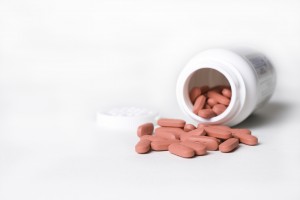I am again going to raise my caution flag about the regular use of ibuprofen and “anti-inflammatory” medications.
Let me just start with the basic medical side effects list.
In 2015, the United States Food and Drug Administration (FDA) strengthened their warning about the increased risk of heart attack or stroke when taking higher doses of ibuprofen. – They call on people to be aware of this possible problem and to seek medical attention at once if they experience chest pain, breathing problems, sudden weakness in one part or one side of the body, or sudden slurred speech.
It should also be used with caution if a person has, or has had:
- asthma

- liver problems
- kidney problems
- mild heart failure
- hypertension, or high blood pressure
- angina, heart attacks (ischemic heart disease)
- narrowing of the arteries, known as peripheral arterial disease
- coronary artery bypass graft (CABG) surgery
- any experience of stomach bleeding
- stroke
The next recommendation the FDA offers is to talk to your personal pharmacist if unsure. HELLO! I don’t know of anyone, patient or otherwise, that talks to a pharmacist when buying a bottle of Advil.
Here is a study that is several years old, but it has been under-reported and deserves attention. It was done on “healthy people” and included very common pain meds, not just ibuprofen. And the risk of stroke was not a weak association, but a striking risk correlation. In some countries, pain medication is by prescription, which includes NSAIDS such as ibuprofen (Advil/Motrin) and naproxen (Aleve). With the country-wide ability to track who took prescriptions, when and how much, researchers tracked the entire Danish population over 10 years choosing only those who had not received chronic pain medications and had not been admitted to the hospital. This relatively healthy “outpatient” non-chronic-pain group was then evaluated.
Those that took even short–term NSAID pain medication had an increased risk of both fatal and non-fatal stroke. Remember the Cox-2 (Vioxx) studies linking the common pain medication to stroke and heart attacks? Since that time, evidence has only accumulated; linking NSAID medications to heart disease risk, and therefore the researchers in this latest study were not overly surprised.
Fosbøl EL, et al. Cause-specific CV risk associated with NSAIDs among healthy individuals. Circ Cardiovasc Qual Outcomes 2010; 3:395-405.
What should surprise us on the receiving end of this study is the strong correlation for healthy people to develop strokes correlated with over-the-counter pain medication usage.
My conclusion: First, just because a drug is over-the-counter (OTC) does not mean it is safe. For pain relief, we should pursue non drug treatments, such as hot and cold water/ice, physical exercise and activity, acupuncture, soft-tissue manipulation, a better night’s sleep. The nutritional treatments that contain Magnesium (take a bedtime), and bromelain (Check out the BCQ product at Fullscript) might prove useful as an alternative to OTC drug treatments.
Second is one of perspective. Inflammation is the process of healing! Who would want to block that? A body builder who lifts heavy weights during a workout will damage tissue. The hypertrophy that develops is, in part, an inflammatory process. Assisting, not blocking, this process allows the person to build strength, muscle recovery and function. True athletes do not pop pain pills, every great athletic coach knows that this interferes with the goal. Instead professional coaches and gyms rely on ice baths, showers, and hot applications to support healing and full recovery. Let’s take a card from their playbook and live with a healthier and more natural appreciation for recovery
Oh yeah, If you are an amateur athlete reading this, you may actually be overtraining. check out this discounted blood test panel from ULTA labtests to see. Exercise, Recovery, Nutrition, Metabolism




Comments are closed.